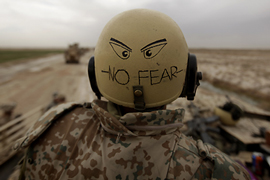Taliban resistance fading in Marjah
Fighters battling a military offensive in Helmand deny they are running out of ammunition.

“The heaviest battles took place on Thursday. That’s the day the Nato forces lost their largest number of troops – six killed on Thursday alone. Since then the battles seem to have died down a little.
“They are still getting return fire from the Taliban, but they believe they may be running low. They say that that’s because they intercepted some of the Taliban’s internal radio messages calling for more ammunition.”
Taliban denial
A Taliban spokesman told Al Jazeera that the radio intercepts were propaganda put out by Afghan forces.
| In depth | |||||||||||||||||||
|
“They are radio messages that have been put there by Afghanistan’s intelligence service – the National Directorate of Security,” Bays quoted the Taliban spokesman as saying.
“He says that it’s false information. It’s there to try and demoralise the Taliban fighters; to make them think that their colleagues are running out of ammunition.”
Bays said that it was unclear who was telling the truth, but it was clear that there had been a significant drop in fighting as the offensive had entered its second week.
However, US Marines said that they were still running into “pockets of stiff resistance”.
“Everywhere we’ve got Marines, we’re running into insurgents,” Lieutenant Josh Diddams, a US Marine spokesman, told The Associated Press news agency.
He said that Taliban fighters were hunkered down in bunkers fortified with sandbags and other materials.
General David Petraeus, the commander of US Central Command, said on Sunday that the Taliban resistance had been “formidable” but “a bit disjointed”.
“The way the operation was conducted leaped over some of them. But there is tough fighting going on without question,” he told NBC television’s “Meet the Press” programme.
Petraeus warned the Taliban that the campaign would not stop with Marjah and nearby Nad Ali.
“This is just the initial operation of what will be a 12 to 18-month campaign as General McChrystal and his team mapped it out,” he said.
Humanitarian fears
The offensive, which was launched on February 13, aims to bring government control over the region, with security, clinics and schools planned for after the Taliban has been subdued.
 |
| About 15,000 US, Nato and Afghan troops are taking part in the Marjah offensive [AFP] |
But as the civilian population remains trapped by the fighting, there are fears of a humanitarian disaster.
Doctors and aid workers have warned that supplies of food and medicine are running low.
“People who are ill cannot get to hospitals and others cannot bring them medicines,” Ajmal Samadi, the head of the Afghan Rights Monitor group, said.
“They cannot get food or even go outside to look after their farms.”
The Marjah operation is a major test of a new US and Nato strategy that stresses protecting civilians over routing Taliban fighters as quickly as possible.
Hamid Karzai, the Afghan president, on Saturday renewed an appeal for international troops to prevent civilian deaths.
Protecting civilians
Addressing parliament’s opening session in Kabul on Saturday, he said: “We need to reach the point where there are no civilian casualties.
“Our effort and our criticism will continue until we reach that goal.”
He held up a picture of an eight-year-old girl who lost 12 relatives in a Nato rocket attack during the second day of the assault on Marjah, which began on February 13.
Eric Tremblay, the Isaf spokesman, told Al Jazeera on Sunday “coalition forces” had made civilians’ safety their priority.
“General Stanley McChrystal [the commander of the international forces] has made it quite clear to our coalition partners and the Afghan national security forces that … the strategy is to protect the population; it is about separating the insurgency from the population,” he told Al Jazeera from Kabul on Sunday.
Three Nato soldiers were reported dead on Sunday in eastern and southern Afghanistan in incidents unrelated to Operation Moshtarak, the International Security Assitance Force (Isaf) said in a statement.
